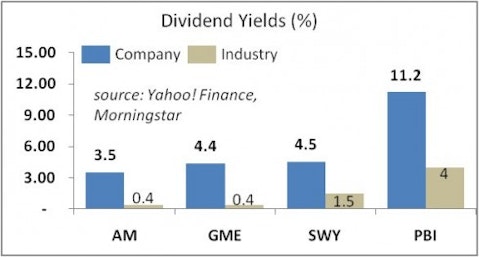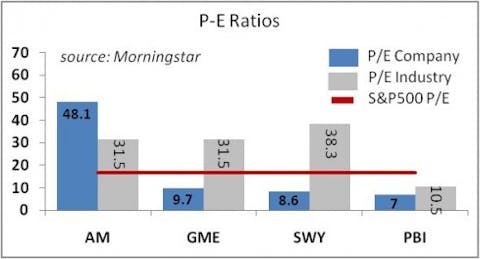While the equity market rally continues this year, several dividend-paying stocks are seeing heavy investor short selling. There are several reasons to sell stocks short. Some investors are pessimistic about the future outlook of the shorted companies, others use short positions to hedge their long exposures, and some engage in merger arbitrage. In general, investors are using this trading activity to optimize their portfolios and maximize returns.
Currently, investors are shorting a number of dividend payers with large dividend yields, assuming, in some cases, that dividend payouts may be unsustainable. At present, investors are heavily shorting American Greetings Corp. (NYSE:AM), GameStop Corp. (NYSE:GME), Safeway Inc. (NYSE:SWY), and Pitney Bowes (NYSE:PBI). When analyzing the shorted stocks, the attention is paid to short interest as percentage of the float, the latter representing the total number of shares available for trading. Here is a closer look at the noted four stocks, with a particular attention paid to the sustainability of their dividend payouts.


American Greetings Corp. (NYSE:AM) designs, manufactures, and sells greeting cards. Currently, the stock’s short interest as percentage of float stands at 45.1%. Over the past five years, this company saw its EPS grow at an average annual rate of 16.4%, while its dividends increased at an average rate of 9.6% per year over the same period. At present, the stock pays a dividend yield of 3.5% on a payout ratio of 167% of trailing earnings and 53% of last year’s free cash flow. The company’s peer CSS Industries Inc. (CSS) pays a dividend yield of 3.0% on a payout ratio of only 26%. Rival Hallmark Cards, Inc. is closely held. American Greetings is a cash cow, although it has seen its revenues drop over the past decade. In general, the company’s greeting cards business is in a secular decline. Recently, the company’s CEO and members of the founding family made a takeover bid for the company’s shares at a price of $17.18 per share, below the company’s book value. The stock is currently trading at $17.08 per share. With claims about management’s breaching of fiduciary duty, a number of law offices has initiated or plans to initiate legal action. As regards its valuation, on a forward P/E basis, American Greetings is trading at a major discount relative to its industry. Fund manager Joel Greenblatt purchased a minor stake in the company in the second quarter.
GameStop Corp. (NYSE:GME) is the world’s biggest retailer of video game hardware and software. Short interest as percentage of the float for this company hovers around 37.2%. The company’s EPS grew at an average rate of 19.3% per year over the past five years, while analysts forecast that the company’s EPS will increase at an average annual rate of 8.9% per year for the next five years. The forecast long-term EPS growth has been revised downward over the past two months. Recently, GameStop Corp. boosted its quarterly dividend by 66.7% to $0.25 a share. Currently, the stock is yielding 4.4% on a payout ratio of 42%. Its main competitor Best Buy Co. Inc. (NYSE:BBY) pays a dividend yield of 3.9%, while rival Amazon (NASDAQ:AMZN) does not pay dividends. GameStop Corp. generates high free cash flow. Over the past five years, its free cash flow grew at an average rate of 13.3% per year. The company has been increasing shareholder value through dividend boost and share buybacks. However, there are some concerns that large buybacks are masking EPS weakness. The video game retail outlook is weak. A research firm NPD Group estimates that game console sale dropped as much as 39% year-over-year in September, while software sales were down 19%. The research group says that “video-game industry sales this year have shrunk as fewer consumers buy packaged titles,” amid a rise in games played on mobile devices. In terms of its valuation, on a forward P/E basis, GameStop Corp. is trading at a deep discount to its respective industry. Among fund managers, value investor Chuck Royce (Royce & Associates) and billionaire Cliff Asness are big fans of the stock.
Safeway Inc. (NYSE:SWY), a food and drug retailer with a market cap of $3.9 billion, is reporting a high short interest as percentage of the float at 31%, an increase compared to a few months back. The company has seen strong revenue and free cash flow growth. Its EPS contracted at an average annual rate of 5% per year over the past five years, while its dividends increased at an average rate of 20.4% per year over the same period. Analysts forecast that the company’s EPS growth will average 9.6% per year for the next five years. The stock currently pays a dividend yield of 4.5% on a payout ratio of 33% of trailing earnings and 27% of last year’s free cash flow. Safeway’s competitor Supervalu (NYSE:SVU) suspended dividend payments this past summer, while rival The Kroger Co. (NYSE:KR) still pays a dividend yield of 2.6%. In its third quarter, the stock reported declining revenues over the year-earlier levels and beat analyst estimates on EPS due to a sharp reduction in its share count. The company has been relying on cash for working capital, which has halved the amount of net free cash in the first 36 weeks of this year compared to the same period of last year. Still, Safeway expects its annual free cash flow to remain unchained relative to the level achieved last year, which makes the company’s dividend surely sustainable. As regards its valuation, on a forward P/E basis, the stock is trading well below its respective peer group. The stock is down 8% over the past 12 months. It is popular with billionaire fund manager Ray Dalio.
Pitney Bowes Inc. (NYSE:PBI) continues to fare as one of the most heavily shorted stocks this year. Its short interest as percentage of the float is 28.1%. This is so despite the company’s status as a dividend aristocrat, which Pitney Bowes has earned raising dividends for the past 25 consecutive years. The company sells mail processing equipment and integrated solutions. Over the past five years, Pitney Bowes EPS shrank at an average annual rate of 7.1%, while its dividends grew at an average rate of 2.7% per year. Analysts forecast that, on average, its EPS will remain flat for the next half decade. Currently, the stock is yielding 11.2% on a payout ratio of 44%. Its competitors Xerox (NYSE:XRX) and Cannon (NYSE:CAJ) are yielding 2.4% and 4.8%, respectively. Despite the company’s stellar dividend history, Pitney Bowes is heavily shorted as investors lack confidence in the long-term sustainability of its business model, given the progress in digital technologies. Still, despite the negative sentiment, Pitney Bowes dividend, albeit currently exceptionally high, appears to be sustainable in the medium term. In terms of valuation, on a forward P/E basis, this stock is trading on par with the electronic office equipment industry. The stock is down nearly 30% over the past year. Tiger cub Philippe Laffont (Coatue Management) owns a stake in the company.





